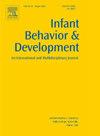Phonological biases in lexical access in French and German: Data from a familiar word-recognition conflict task
IF 1.9
3区 心理学
Q3 PSYCHOLOGY, DEVELOPMENTAL
引用次数: 0
Abstract
Consonants have been proposed to be more important than vowels in lexical processes (i.e., C-bias). This study investigated the existence and strength of the C-bias using a familiar word recognition conflict task, in which recognition takes place in the context of a conflict between consonantal and vocalic information. This was evaluated using eye-tracking in two linguistic populations (French and German) and two age groups (adults and 24-month-old toddlers). The experiment tested the recognition of a target object among two familiar objects presented on a screen. In the control condition, the auditory stimulus corresponded to one of the objects presented. In the conflict condition, the stimulus differed from the name of one of the objects by a consonant and from the other by a vowel. In the control condition, word recognition was found in all groups. In the conflict condition, contrary to our predictions, we failed to find evidence of a C-bias in both French- and German-speaking participants, at both ages. Rather, the analyses revealed phonological similarity effects on participants’ lexical access, which varied across languages but were similar across ages. In French, word recognition was sensitive to phonological distance, with a looking preference for the familiar words with less feature changes from the mispronounced words. In German, word recognition was sensitive to the rhyme, with a looking preference for the familiar words rhyming with the mispronounced words. We discuss these findings in terms of task-specific effects and speculate about why a C-bias was not elicited in the current study.
法语和德语词汇获取中的语音偏差:来自一个熟悉的词识别冲突任务的数据
辅音被认为在词汇过程中比元音更重要(即c偏误)。本研究通过一个熟悉的单词识别冲突任务考察了c偏差的存在和强度,在该任务中,识别发生在辅音和语音信息冲突的背景下。研究人员对两种语言人群(法语和德语)和两个年龄组(成年人和24个月大的幼儿)进行了眼动追踪。该实验测试了在屏幕上呈现的两个熟悉的物体中识别目标物体的能力。在控制条件下,听觉刺激对应于所呈现的一个物体。在冲突条件下,刺激物与其中一个物体的名字有一个辅音的不同,而与另一个物体的名字有一个元音的不同。在控制条件下,所有组都有单词识别。在冲突条件下,与我们的预测相反,我们未能在两个年龄段的法语和德语参与者中找到c偏倚的证据。相反,分析揭示了语音相似性对参与者词汇获取的影响,这种影响在不同语言之间有所不同,但在不同年龄之间是相似的。在法语中,单词识别对语音距离很敏感,人们更倾向于寻找熟悉的单词,而发音错误的单词特征变化较小。在德语中,单词识别对押韵很敏感,人们会倾向于寻找与发音错误的单词押韵的熟悉单词。我们从任务特定效应的角度来讨论这些发现,并推测为什么在当前的研究中没有引起c偏倚。
本文章由计算机程序翻译,如有差异,请以英文原文为准。
求助全文
约1分钟内获得全文
求助全文
来源期刊

Infant Behavior & Development
PSYCHOLOGY, DEVELOPMENTAL-
CiteScore
4.10
自引率
4.80%
发文量
94
期刊介绍:
Infant Behavior & Development publishes empirical (fundamental and clinical), theoretical, methodological and review papers. Brief reports dealing with behavioral development during infancy (up to 3 years) will also be considered. Papers of an inter- and multidisciplinary nature, for example neuroscience, non-linear dynamics and modelling approaches, are particularly encouraged. Areas covered by the journal include cognitive development, emotional development, perception, perception-action coupling, motor development and socialisation.
 求助内容:
求助内容: 应助结果提醒方式:
应助结果提醒方式:


